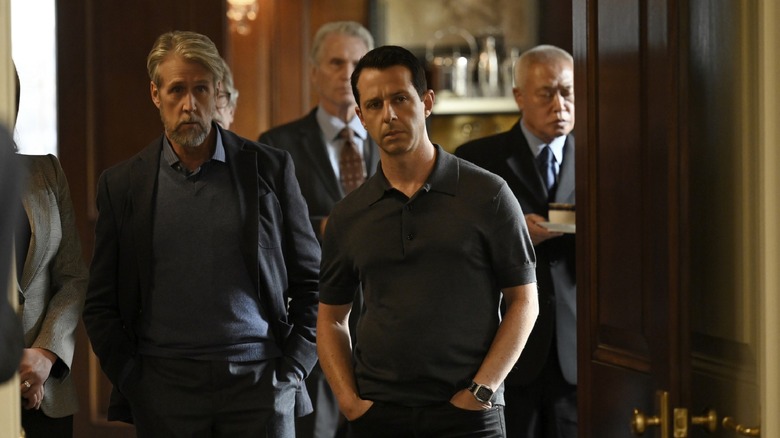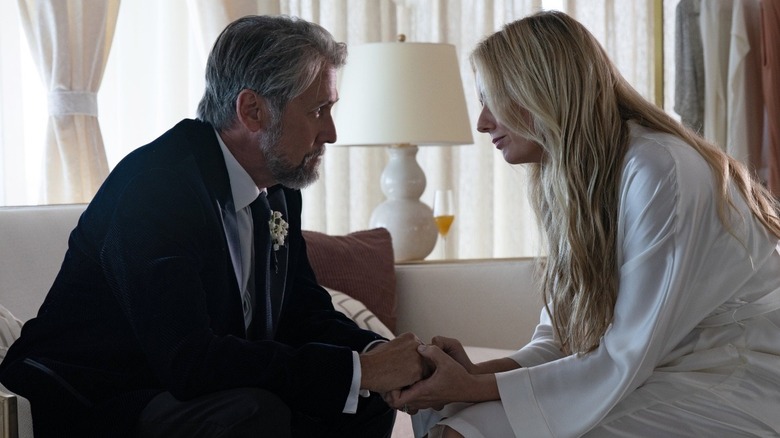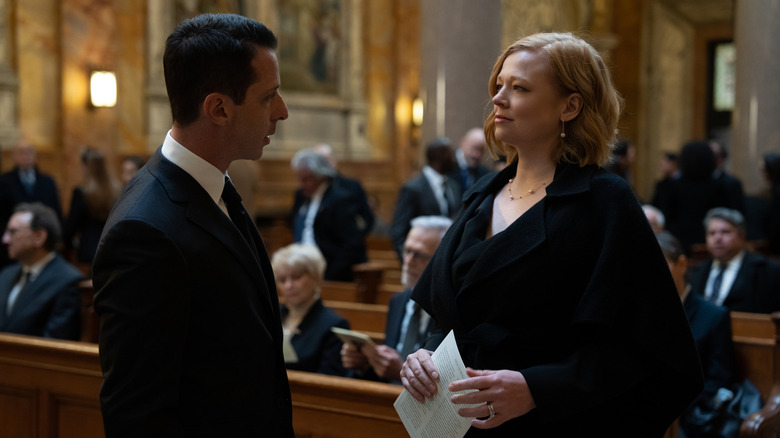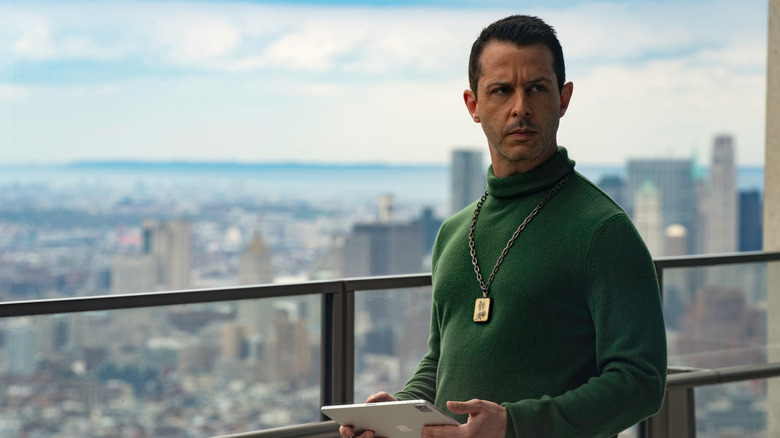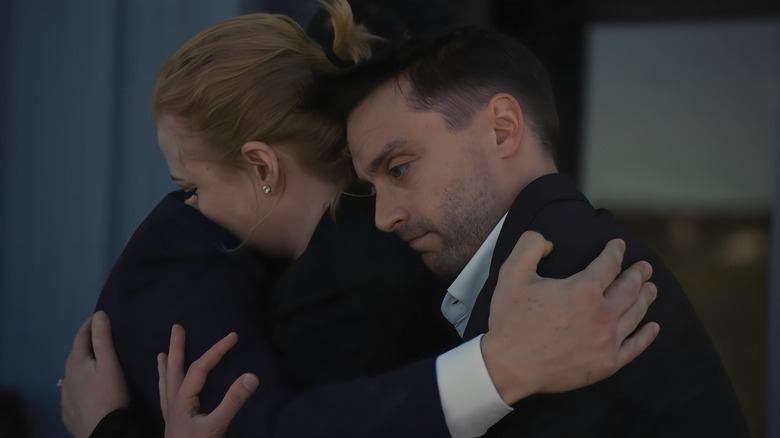Succession Director Mark Mylod Set Emotional 'Traps' For The Stars All Throughout The Series
Has television ever seen performances quite like those in "Succession?" The show's cast delivered some of the most devastating scenes of all time season after season, all leading up to an absolutely gut-wrenching final few episodes. A lot of credit is due to the all-star actors, which has earned them multiple Emmys and several more nominations. But these breathtaking performances were also evoked by directors like Mark Mylod, who worked behind the scenes on some of the most pivotal episodes of the series. Mylod and the other directors, along with series creator and head writer Jesse Armstrong, are as much responsible for the show's most memorable moments as the actors — although they might humbly disagree. Their methods may be questionable, but they worked time and time again.
Mylod is known for setting "traps" for his actors to fall into, things that might immerse them further in the scenes, although the actors don't need much help to access their characters' dark emotional depths. Instead, Mylod infuses each of his episodes with "smaller things in the hunt for verisimilitude," as he told GQ. One example he gave is planting noisy background actors throughout the boat as the Roy siblings try to find each other and deliver the news that their father is dying. The constant conversation and crowds left the actors with "no place to hide," Mylod explained. This heightened the tension of this emotionally fraught episode while calling attention to how an incredibly private and intimate moment in this family must instantly become a public-facing fiasco.
But a loud-talking crowd wasn't the only obstacle that Mylod had laid out for the "Succession" cast. He wanted the audience to feel the same emotional uncertainty as the Roy siblings do — and he had a few tricks up his sleeve to pull it off.
Connor's wedding was the perfect place to lay traps
When Roman gets the call from Tom about the death of his father, everything kicks into high gear. This earth-shattering news reaches them in a shockingly mundane and disjointed way, through a poorly serviced phone call from a private jet to a cruise ship. The nature of this stilted delivery supplements the frustration of the Roy siblings who, with all their fortune and influence, are suddenly rendered totally powerless. The direction of the episode was tasked with maintaining a sense of urgency from the confines of a cabin.
"From that phone call to the end, things have to feel like an emergency," explained Jeremy Strong, who plays Kendall, in a behind the scenes featurette. Part of this frantic energy was expressed through Strong and his co-stars directly, but it could also be found in the cinematography.
"In the planning of the shots it felt to me like the camera had to be almost sadistically voyeuristic," Mylod added. "It had to stay really close without kind of taking its eye off them, because every time we sort of cut away from the siblings it seemed to let them off the hook. So we worked on this idea of how could we keep the action as fluid as possible so it's unflinching."
The most "unflinching" way to keep the cameras on the siblings, Mylod found, was to shoot a 30-minute sequence in one take. This presented a technical challenge, which was met by hiding film and supplementary cameras around the set to reload as the lens followed the actors around the ship. But the cameras weren't the only things that were hidden throughout the set in this "real-time" sequence, which begins just before that fateful phone call. The actors were also hidden around the set for their co-stars to find them.
Strong had to search for Snook in character
By hiding the actors within the "Succession" set, Mylod accentuated the tension and uncertainty of this most pivotal scene. The actors weren't sure where to find each other, and the audience felt this insecurity in their performance. Strong in particular prefers to be given tools like this to submerge himself in a scene, so he was the perfect candidate for this technique.
"When Jeremy [Strong] went downstairs to find Sarah [Snook, who plays Shiv Roy] he didn't know where Sarah was, so he had to look for her," the director recalled to GQ. "It seems quite petty, but when you get into the edit you get the sense of those characters discovering the moment as [they] go. It's important for this one because they are desperately seeking clarity, they're seeking information. They're on a search and we had to be on the search with them."
Strong has been known to take an immersive approach to his performances, so much so that he has faced criticism from his fellow "Succession" cast members. Brain Cox, who plays his on-screen father in the series, voiced his concern for the toll on Strong's mental health in a now-infamous New Yorker profile. The article also cites Strong's outlandish actorly requests at the cost of his physical wellbeing, like being sprayed with tear gas or "roughed up" by the stunt coordinator while shooting protest scenes for "The Trial of the Chicago 7."
"I don't like saying no to Jeremy," admitted the film's director, Aaron Sorkin. "But there were 200 people in that scene and another 70 on the crew, so I declined to spray them with poison gas."
The props department goes above and beyond to immerse Strong
Luckily, the "Succession" directors understood Strong's unique way of working and were willing to play ball in order to evoke the kind of groundbreaking performances that only he is capable of. This involved a rather unprecedented level of communication between the actor and the props department, particularly when it came to Kendall's extravagant birthday bash. The party was a carefully curated event where Kendall was as demanding and spoiled as ever — so, of course, Strong followed suit. Some of his special requests for the episode included a flashy neckpiece and customized drink stirrers.
"I asked them to make a drink stirrer with my face on it, like 3D printed, with a crown," he revealed to GQ. "So they did."
One of the most heartbreaking moments of this episode — which itself acts as an exploration into Kendall's troubled psyche — is when the show's dark prince searches fruitlessly for the gift his children have given him among a pile of expensive presents from faceless party guests. This was another instance where the "Succession" props department went the extra mile so as to immerse Strong in the scene.
"One big thing was we decided we didn't want to have a bunch of empty boxes," said the episode's director, Lorene Scafaria, in an interview with Vulture. "We didn't want that usual movie magic, where the pile of supposed presents is a bunch of empty boxes with no actual presents inside. We tried to fill as many boxes as we could, so if Jeremy really got into it and started ripping things open, if he started breaking things, if he started stepping on things, he wouldn't be feeling some fake empty boxes and be taken out of the moment."
Are these emotional traps worth it?
Going to such lengths to ground Strong and his co-stars in a scene might seem over-the-top, but it creates undeniable results. The directors tried to appeal to Strong and his co-stars' acting backgrounds to help them access a more honest place while balancing practical concerns. In the pivotal third episode of season 4, this meant allowing Strong to find Snook hidden somewhere in the set. In the season 3 finale, the hotel staff interrupts Kendall's emotional confession of manslaughter to his siblings, per GQ. And in Kendall's birthday episode, Strong was destroying a room full of real presents — well, a few real presents, anyway.
"We had to draw the line somewhere, but in the end, we were prepared to have the pile be trampled on in at least three takes," Scafaria went on (via Vulture). "This kind of thing is all about creating a space. I was thinking of it as another black box for a wonderful group of theater actors with a set where Jeremy would be able to reach an honest place."
The technical challenges that accompany this technique were all worth it in the end. Not only did it create a bone-chilling scene for the audience, it moved the director to tears during the shoot.
"I cried on set," Scafaria admitted. "And then I thought, 'God, I'm crying over Kendall?' But I couldn't help it. This kind of scene is what Jeremy is all about: bringing the soul, the truthfulness."
The traps that Mylod and Scafaria set for Strong and his co-stars might be considered dramatic or even sadistic, but they worked every time. In creating the best show of all time, what's a lost dollar or an extra minute of confusion if it helps the actor deliver an Emmy award-winning performance?
